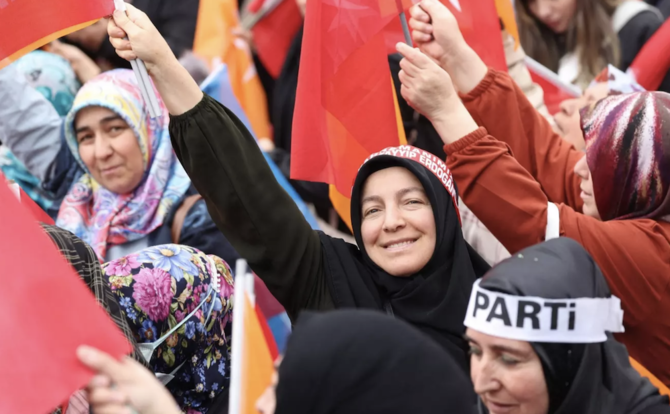Sinem Cengiz
In 1934, Turkish women accomplished a milestone that predated many other nations: They secured the right to vote and stand for elected positions. They exercised their electoral rights for the first time in the 1935 elections, in which 18 women were elected to the Turkish Grand National Assembly. One of them, Nakiye Elgun, emerged as a trailblazer, becoming the first female MP to deliver a speech at the parliament, only about 12 years after the Republic of Turkiye was founded. In a message she wanted to deliver to the world, Elgun said that “we are a complete whole together,” emphasizing the importance of men and women working together in politics.
Since then, women have been active in the Turkish national political landscape. Yet, despite their enduring presence, they are still striving to find equality in the political realm.
For decades, the number of women in the Grand National Assembly lagged and even dropped over the years. Up until 2007, they did not exceed 5 percent of the lawmakers. The latest parliamentary elections, held simultaneously with the presidential vote last May, brought an unprecedented number of women MPs: 119 in the 600-seat assembly.
The importance of women’s support in shaping electoral outcomes also became increasingly apparent ahead of the 2023 elections, as Turkish political parties, which have their own women’s branches that are connected to their headquarters, ramped up their efforts to gain the support of women.
This upward trajectory in female political involvement was further underscored by last Sunday’s local elections, which saw the main opposition Republican People’s Party, known as the CHP, again claim victory in key cities like Istanbul and Ankara. The elections witnessed a surge in female mayors, with women elected to lead in a record 11 provinces out of 81, including five metropolitan municipalities.
Ten of the 11 female mayors were from opposition parties, with data from the Women’s Platform for Equality indicating that they garnered nearly 53 percent of the vote on average. Women won 64 of Turkiye’s 922 districts, including in Istanbul, Ankara, Izmir, Adana and Antalya, with most of them being from the CHP. In the last local vote in 2019, only four female mayors were elected.
However, Turkish politics still wears a moustache, even after 90 years of women’s participation. Although women now have a relatively large presence in the assembly and 11 mayoralties, this number still lags behind expectations. However, the underrepresentation of women in national politics is not a situation unique to Turkiye, as similar challenges persist globally. According to studies, women account for half or more of the lawmakers in just five countries.
Despite the patriarchal underpinnings of the Turkish political arena, there is a growing societal consensus on the need for greater female participation in policymaking. A recent survey conducted by KONDA revealed that 62 percent of respondents believe that female politicians can contribute to Turkiye’s development and societal progress. Therefore, the outcome of Sunday’s elections signifies a political shift and heralds a broader change in societal mindset. It also reflects the long struggle for women to be represented in the country’s decision-making mechanisms and serves as an inspiration for future generations.
Women have a significant presence in the opposition ranks, but the ruling Justice and Development Party, known as the AKP, has started to lose the support of conservative women voters, who are usually a pillar of the party’s voting base. This is considered to be one of the key reasons for the decline in AKP votes.
For a long time, conservative women have been central to the AKP’s electoral victories, largely due to its 2010 reversal of the headscarf ban that kept many women out of university. President Recep Tayyip Erdogan and his party often reminded the Turkish public of how the AKP helped strike down the headscarf ban. Erdogan believes he has done more for women than many of his predecessors, although many believe that this measure alone was not enough and more should have been done for women.
Today, conservative women are not a homogeneous voting bloc in Turkiye and AKP has lost the support of some of them. There are women who wear headscarves in the ranks of the CHP and other parties that have been critical of the government’s policy on women.
Turkiye’s 2021 withdrawal from the Istanbul Convention — aka the Council of Europe Convention on Preventing and Combating Violence Against Women and Domestic Violence — caused a backlash not only from the secular segments of society but also conservative ones. Istanbul Mayor Ekrem Imamoglu condemned the AKP for withdrawing from the convention in the middle of the night, saying the move “trampled on the struggle women have led for years.”
In a 2021 Arab News column, I stated that the AKP needed the support of conservative women more than ever because losing their vote would indicate a major political stumble for the party. This is because the AKP owes much of its success to these women. It now needs to win back the hearts of those who supported the party in its early years.
Last Sunday’s elections gave significant messages in regard to people’s frustration over the economic situation, the future of Turkiye’s foreign policy, shifting societal dynamics and the rise of women’s representation in Turkish politics. While Turkiye has made significant strides in advancing women’s representation in politics, challenges persist on the path toward true gender parity.
The electoral outcomes underscore both the progress made and the work that lies ahead in ensuring equitable political participation for all citizens.







